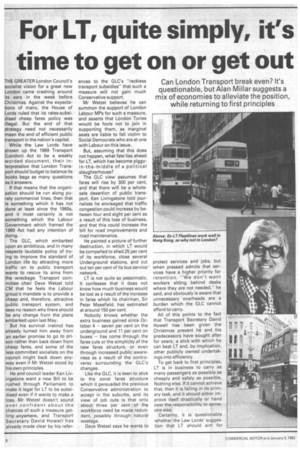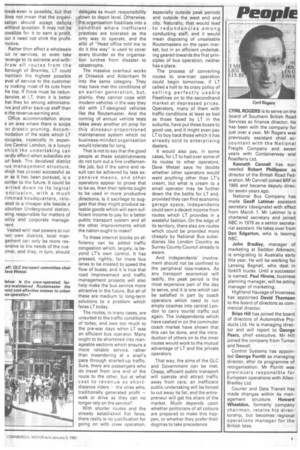For LT, quite simply, it's time to get on or get out
Page 8

Page 9

If you've noticed an error in this article please click here to report it so we can fix it.
Can London Transport break even? It's questionable, but Alan Millar suggests a mix of economies to.alleviate the position, while returning to first principles
THE GREATER London Council's socialist vision for a great new London came crashing around its ears in the week before Christmas. Against the expectations of many, the House of Lords ruled that its rates-subsidised cheap fares policy was illegal. But the end of that strategy need not necessarily mean the end of efficient public transport in the nation's capital.
While the Law Lords have shown up the 1969 Transport (London) Act to be a weakly worded document, their interpretation that London Transport should budget to balance its books begs as many questions as it answers.
If that means that the organisation should be run along purely commercial lines, then that is something which it has not done at least since the 1960s, and it most certainly is not something which the Labour Government which framed the 1969 Act had any intention of doing.
The GLC, which embarked upon an ambitious, and in many respects laudable policy of trying to improve the standard of London life by attracting more traffic on to public transport wants to rescue its aims from the wreckage. Transport committee chair Dave Wetzel told CM that he feels the Labour group's mandate is to provide a cheap and, therefore, attractive public transport system, and sees no reason why there should be any change from the plans embarked upon last May.
But his survival instinct has already turned him away from an earlier promise to go to prison rather than back down from cheap fares, and some of the less committed socialists on the council might back down anyway even if Mr Wetzel stood by his own principles.
He and council leader Ken Livingstone want a new Bill to be rushed through Parliament to make it legal for LT to be subsidised even if it wants to make a loss. Mr Wetzel doesn't sound over confident about the chances of such a measure getting anywhere, and Transport Secretary David Howell has already made clear by his refer
ences to the GLC's "reckless transport subsidies" that such a measure will not gain much Conservative support.
Mr Wetzel believes he can summon the support of London Labour MPs for such a measure, and asserts that London Tories would be fools not to join in supporting them, as marginal seats are liable to fall victim to Social Democrats who are at one with Labour on this issue.
But, assuming that this does not happen, what fate lies ahead for LT, which has become piggyin-the-middle of a political slaughterhouse?
The GLC view assumes that fares will rise by 300 per cent, and that there will be a wholesale desertion of public transport. Ken Livingstone told journalists he envisaged that traffic congestion could increase by between four and eight per cent as a result of this loss of business, and that this could increase the bill for road improvements and road maintenance.
He painted a picture of further destruction, in which LT would be compelled to shed 25 per cent of its workforce, close several Underground stations, and cut out ten per cent of its bus service network.
LT is not quite so pessimistic. It confesses that it does not know how much business would be lost as a result of the increase in fares which its chairman, Sir Peter Masefield, has estimated at around150 per cent.
Nobody knows whether the extra business gained since October 4 — seven per cent on the underground and 11 per cent on buses — has come through the fares cuts or the simplicity of the new fares structure, or even through increased public awareness as a result of the controversy surrounding the GLC's changes.
Like the GLC, it is keen to stick to the zonal fares structure which it persuaded the previous Conservative administration to accept in the suburbs, and its view of job cuts is that only about three . per cent of the workforce need be made redundant, possibly through natural wastage.
Dave Wetzel says he wants to protect services and jobs, but when pressed admits that services have a higher priority for retention. "We don't want workers sitting behind desks where they are not needed," he said, and obviously is aware that unnecessary overheads are a burden which the GLC cannot afford to carry.
All of this points to the fact that Transport Secretary David Howell has been given the Christmas present he and his predecessors have sought after for years; a stick with which he can beat LT and, by implication, other publicly owned undertakings into efficiency.
To get back to first principles, LT is in business to carry as many passengers as possible as cheaply and safely as possible. Nothing else. If it cannot achieve that, then it is failing in its primary task, and it should either improve itself drastically or hand over the responsibililty to someone else.
Certainly, it is questionable whether the Law Lords' suggestion that LT should aim for
break-even is possible, but that loes not mean that the organisation should accept deficits Nithout question. It may not be aossible for it to earn a profit, DUt it need not shirk the profitTtotive.
Rather then effect a wholesale 7.ut in services, or even take -evenge to its extreme and withiraw all routes from the 3orough of Bromley, LT could -naintain the highest possible evel of service to the customer ay making most of its cuts from 'he top. If there must be reduniancies at LT, then it is better hat they be among administraive and other back-up staff than it the revenue-earning end.
Office accommodation alone s an area where there is scope or drastic pruning. Accomnodation of the scale which LT )ccupies, especially in expen;ive Central London, is a luxury vhich the undertaking can iardly afford when subsidies are ,ut back. The devolved district )us management structure, vhich has proved successful as ar as it has been pursued, is a lointer to the future. It could be arried down to its logical onclusion, with a much rimmed headquarters, reloated to a cheaper site beside a uburban Underground station, leing responsible for matters of iolicy and corporate managenent.
Vested with real powers to run neir own districts, local mangement can only be more res,onsive to the needs of the cusDmer, and they, in turn, should
delegate as much responsibility down to depot level. Otherwise, the organisation fossilises into a condition where inefficient practices are tolerated as the only way to operate, and the alibi of "Head office told me to do it this way" is used to cover every blunder as the organisation lurches from disaster to catastrophe.
The massive overhaul works at Chiswick and Aldenham fit into the same category. They may have met the conditions of an earlier generation, but, plainly, they cannot cope with modern vehicles in the way they did with LT-designed vehicles like the Routemaster. And the coming of annual vehicle tests takes away another pit prop for this dinosaur-proportioned maintenance system which no business-minded organisation would tolerate for long.
That is not to say that the good people at these establishments do not turn out a fine craftsmanlike job, but if the same end result can be achieved by less expensive means, and other operators appear to prove that to be so, then their talents ought to be used in more productive directions. Is it sacrilege to suggest that they might produce saleable goods which will earn sufficient income to pay for a better public transport system and all the other improvements which the nation ought to make?
To these internal blocks on efficiency can be added traffic congestion which, largely, is be yond LT's own control. It has pressed, rightly, for more bus lanes to be created to speed the flow of buses, and it is true that road improvement and traffic management projects will also help make the bus service more attractive in the future. But all of these are medium to long-term solutions to a problem which faces LT today.
The routes, in many cases, are unsuited to the traffic conditions of today, and owe too much to the pre-war days when LT was an efficient bus operator. Many ought to be shortened into manageable sections which ensure a more reliable service, rather than meandering at a snail's pace through snarled-up traffic. Sure, there are passengers who do travel from one end of the route to the other, but at what cost to revenue as shortdistance riders the ones who, traditionally generated profit walk or drive as they can no longer rely on the service?
With shorter routes and the already established flat fares, there really is no justification for going on with crew operation, especially outside peak periods and outside the west end and city. Naturally, that would lead to redundancies among conducting staff, and it would mean disposing of unsaleable Routemasters on the open market, but in an efficient undertaking geared towards the first principles of bus operation, neither has a place.
The process of converting routes to one-man operation could begin tomorrow, if LT called a halt to its crazy policy of selling perfectly usable Fleetlines on to the secondhand market at depressed prices. Operators, many of them with traffic conditions at least as bad as those faced by LT in the suburbs, have put these buses to good use, and it might even pay LT to buy back those which it has already sold to enterprising dealers.
It would also pay, in some cases, for LT to had over some of its routes to other operators. Dave Wetzel says he doubts whether other operators would want anything other than LT's cream, but what is cream to a small operator may be further down the the bottle for LT and, provided they can find economic garage space, independents could earn a decent income from routes which LT provides in a wasteful fashion. On the edge of its territory, there also are routes which could be provided more cheaply by National Bus subsidiaries like London Country as Surrey County Council already is aware.
And independents' involvement should not be confined to the peripheral loss-makers. As any transport economist will testify, the peak period is the most expensive part of the day to serve, and it is one which can be satisfied in part by coach operators which need to run empty coaches into central London to carry tourist traffic out again. The independents which have cashed in on the commuter coach market have shown that this can be done, and the introduction of others on to the inner routes would work to the mutual advantage of LT and the private operators.
That way, the aims of the GLC and Government can be met. Cheap, efficient public transport will operate and attract traffic away from cars; an inefficient public undertaking will be forced to cut away its fat; and the entrepreneur will get his share of the market. Much depends upon whether politicians of all colours are prepared to make this happen, or whether they prefer their dogmas to take precedence.














































